This week, a special court found former Pakistani ruler General Pervez Musharraf guilty of high treason under article 6 of Pakistan’s constitution — for suspending the constitution when he imposed a state of emergency in November 2007 — and sentenced him to death. Article 6 holds that a person who “abrogates or subverts or suspends or holds in abeyance” the country’s constitution has committed high treason. Musharraf can appeal the verdict in the Supreme Court.
Given that he is currently living in Dubai, the sentence is unlikely to be carried out, even if it is upheld by the Supreme Court. Nevertheless, this is an unprecedented verdict and an unprecedented ruling against a former army chief, and it serves as an unmistakable blow to Pakistan’s powerful military. It has ignited a legal and political firestorm in Pakistan.
The background
The verdict against Musharraf caps a six-year trial since he was first booked for high treason in court in December 2013, under a case moved by former prime minister Nawaz Sharif’s government. Sharif had signaled his intent to bring high treason charges against Musharraf in June 2013, right after he came into power.
Musharraf and Sharif have a singular history. In October 1999, Musharraf, then Sharif’s chosen chief of army staff, dissolved parliament and ousted Sharif in a bloodless coup. Musharraf declared himself president of Pakistan in 2001, and held general elections in 2002, after disqualifying Sharif and former prime minister Benazir Bhutto from running for office. That year, his newly formed Pakistan Muslim League (Quaid) — which many called a “King’s party,” created with the help of defectors from Sharif’s party, the Pakistan Muslim League (Nawaz) — won control of parliament, cementing Musharraf’s hold on power.
Five years later, in 2007, his precipitous fall from power began when he clashed with Pakistan’s judiciary. In March of that year, he sacked the chief justice, leading to widespread lawyers’ protests. On November 3, 2007, he suspended the constitution, imposed a state of emergency, and placed dozens of senior judges under house arrest. He restored the constitution in December 2007. In 2009, the Supreme Court ruled that Musharraf’s decision to impose the emergency was illegal, and in 2013, Sharif’s government brought charges of high treason against him for imposing the 2007 emergency.
The six-year saga of the treason trial included Musharraf failing to appear in court dozens of times, postponement of the hearing date because of his illnesses, six reconstitutions of the special court, and multiple prosecution heads quitting or being fired by the government. Musharraf, who had been placed on a no-fly list, received a one-time permission to travel abroad on medical grounds in 2016. He has not returned to Pakistan since.
Earlier this year, the Supreme Court issued an order to the special court overseeing the treason case that it could proceed with the trial and the verdict without Musharraf’s statement, given that he had refused to appear in court. This fall, Khan’s government tried to have the announcement of the verdict delayed; the court finally issued an initial verdict on December 17, with the detailed verdict released on December 19.
The detailed verdict, with one dissenting judge and two judges in favor, refers to the repeated delays in the trial, saying Musharraf had “persistently and stubbornly strived ever since the commencement of this trial, to delay, retract and in fact evade it.” One paragraph in the judgment, authored by Justice Waqar Seth, is particularly gruesome:
We direct the law enforcement agencies to strive their level best to apprehend the fugitive/convict and to ensure that the punishment is inflicted as per law and if found dead, his corpse be dragged to the D-Chowk, Islamabad, Pakistan [a large public square near Pakistan’s parliament, presidency, and Supreme Court] and be hanged for 03 days.
This paragraph — which will be nonbinding given that the second concurring judge, Justice Shahid Karim, has taken specific exception to it — has drawn widespread condemnation, even by those otherwise in agreement with the verdict.
The military’s reaction
Although the sentence against Musharraf may not be carried out, the symbolism in such a decision against a former army chief is enormous, and Pakistan’s military has seen it as a decision against the institution. It has reacted in harsh terms against the verdict, issuing an initial statement saying that it is standing by Musharraf and is in “pain and anguish” over the verdict, and asserting that “an ex-Army Chief, Chairman Joint Chief of Staff Committee and President of Pakistan, who has served the country for over 40 years, fought wars for the defense of the country can surely never be a traitor.” The military has also protested the trial being concluded “in haste” and without Musharraf present. It used even stronger language against the detailed verdict on December 19, saying that it “transgresses humanity, religion, culture and any other values.”
Where Khan’s government stands
The position of current Prime Minister Imran Khan’s government is close to the military’s. In 2007, when Musharraf imposed the emergency, Khan, then a minor politician, had argued that Musharraf had in fact committed high treason by subverting the constitution. But now, Khan is beholden to the army for paving the way for him to become prime minister, and he will stand by the military as an institution. What is more, many former Musharraf loyalists are now members of his cabinet. This explains why Khan’s government tried to have the verdict delayed, and why his attorney general, in response to the initial verdict, characterized the trial as “void” and the verdict as “unfair” because it was conducted with Musharraf in absentia.
The attorney general indicated that the government will defend Musharraf as the case moves to its appeal in the Supreme Court. In response to the detailed judgment, the government has said that it will approach the Supreme Judicial Council to restrain and remove Judge Seth, who authored the controversial paragraph about the hanging in Islamabad’s public square.
All this also means that Khan’s government will be unlikely to make a move to force Musharraf to return from Dubai if the verdict is upheld by the Supreme Court – though the judiciary may try to pressure it to do so.
A controversy around the verdict
Beyond the paragraph proposing a barbaric public hanging, the verdict has been controversial on several other grounds. There has been debate on the fact of the trial occurring in absentia, as well as on the timing of the initial verdict, seemingly given out in a hurry just two days before the current Supreme Court Chief Justice Asif Khosa is set to retire on December 20. The timing is no coincidence, as it is this chief justice who ordered the special court to go ahead and hold the trial in absentia in March. It is also this chief justice who, in the detailed verdict issued just days ago on the case of the army chief’s extension, stated: “Howsoever high you may be; the law is above you,” a pointed dig at the military.
There is little question that Justice Khosa was aiming to assert power — continuing a trend of an activist, powerful judiciary in Pakistan, but one that is meaningfully pushing back and taking on the military in this way for the first time. In fact, throughout Pakistan’s history, its judiciary has issued judgments rubber-stamping coups by military dictators who abrogated the constitution under the “doctrine of necessity.” Some observers have questioned this case and this judgment against Musharraf on the suspension of the constitution and whether it was as serious a crime as abrogation, which has always been given a pass due to the judiciary itself. The dissenting judge has also pointed out that “suspension and holding in abeyance” was added to article 6 as an amendment in 2010, more than two years after the state of emergency was imposed in 2007 (though subversion was part of article 6 originally). It is clear that the legal battle over the judgment will continue.
The state of civil-military-judiciary relations in Pakistan
Political parties other than Khan’s hailed the initial verdict as pro-democracy in Pakistan – despite obvious questions about the severity of the death penalty — given the strong precedent that it sets against the military being able to assume power via a coup or impose a state of emergency. This leads to a somewhat ironic situation, with the current civilian government now pitted against other political parties on a move seen as fundamentally pro-democracy.
Ultimately, if this decision ends up weakening Pakistan’s military somewhat, that should be seen as good news for any civilian leader in the country, including Khan — but Khan may fear that a weaker military may be unable to guarantee his own power. More fundamentally, he has tied his fortunes to the military, saying repeatedly that he is on the same page as it, and cannot be seen as anti-military on this decision.
This verdict continues a tentative military-judiciary clash that began late last month when the Supreme Court suspended the current army chief’s extension; this judgment has dramatically upped the ante. Pakistan’s judiciary now seems to be taking on the role of holding the military accountable and pushing back against it at a time when its political parties either don’t want to or cannot do so.
Fall from grace
The story of Musharraf’s fall is a remarkable one, especially for those in the West who remember him as the prominent face of Pakistan as an ally in the war on terror post-9/11. Musharraf was later revealed to be duplicitous in his dealings with the United States, but his ultimate fall from grace in Pakistan was due to a very different, entirely domestic issue. It is no coincidence that that fall began with a clash with the judiciary in 2007, and it was the judiciary again that landed a blow to him and his institution this week. In Pakistan, the hyphenated civil-military power struggle has now morphed into a civil-military-judiciary one. And it is this new military-judiciary clash that is the crucial one to watch for the future of Pakistan’s civilian institutions.
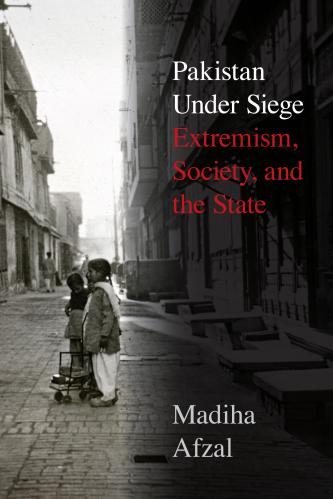
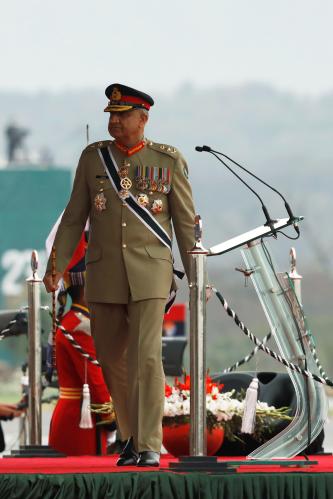
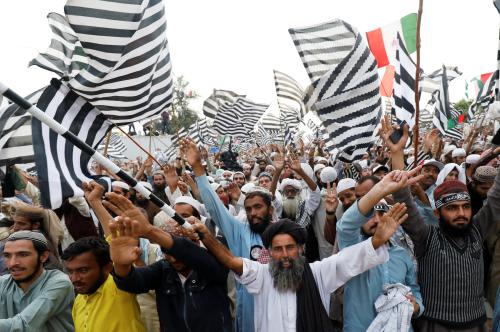

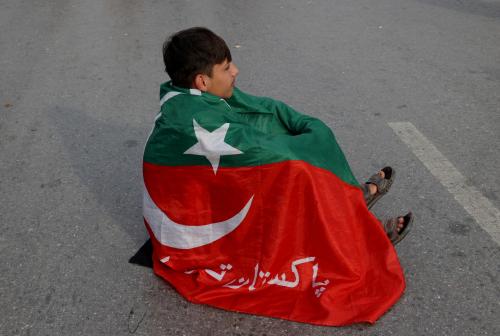
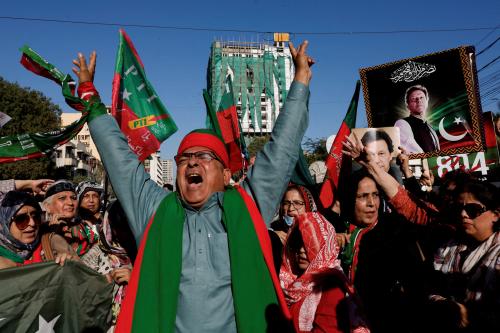
Commentary
Why Pakistan’s former ruler Musharraf was sentenced to death, and what it means
December 19, 2019